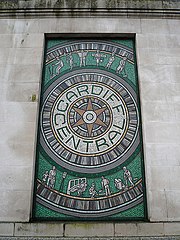Taff Vale Railway Co v Amalgamated Society of Railway Servants
| Taff Vale Railway Co v Amalgamated Society of Railway Servants | |
|---|---|
 |
|
| Court | House of Lords |
| Decided | 22 July 1901 |
| Citation(s) | [1901] UKHL 1, [1901] AC 426 |
| Case history | |
| Prior action(s) | [1901] 1 KB 170 (CA) and |
| Court membership | |
| Judge(s) sitting | Earl of Halsbury LC, Lord Macnaghten, Lord Shand, Lord Brampton and Lord Lindley |
| Keywords | |
| Right to strike, economic tort, conspiracy | |
Taff Vale Railway Co v Amalgamated Society of Railway Servants [1901] UKHL 1, commonly known as the Taff Vale case, is a formative case in UK labour law. It held that, at common law, unions could be liable for loss of profits to employers that were caused by taking strike action.
The labour movement reacted to Taff Vale with outrage; the case gave impetus to the establishment of the UK Labour Party and was soon reversed by the Trade Disputes Act 1906. It was reversed at common law in Crofter Hand Woven Harris Tweed Co Ltd v Veitch [1942].
A trade union, called the Amalgamated Society of Railway Servants, went on strike to protest against the company's treatment of John Ewington, who had been refused higher pay and was punished for his repeated requests by being moved to a different station. When the Taff Vale Railway Company employed replacement staff, the strikers engaged in a sabotage campaign, greasing the rails and uncoupling the carriages. The Taff Vale Railway Company thus decided to engage with the union for the purpose of collective bargaining and the workers returned to work. The Railway Company, however, decided to sue the union for damages and won.
Previously it had been thought that trade unions could not be sued, because they were unincorporated entities, under the law of trusts.
Judge George Farwell held in favour of the company. His decision was reversed by the Court of Appeal, but restored on further appeal to the House of Lords.
The House of Lords ruled that, if a union is capable of owning property, and capable of inflicting harm on others, then it is liable in tort for the damage it causes. Here, the damage was said to be the economic loss caused to the company when the employees broke their contracts of employment to go on strike. So the Taff Vale Railway Co was successful in suing for damages. It was awarded £23,000 plus court costs, reaching a total of £42,000. This set the precedent that unions could be held liable for damages resulting from actions by its officials. The Earl of Halsbury LC began.
...
Wikipedia
